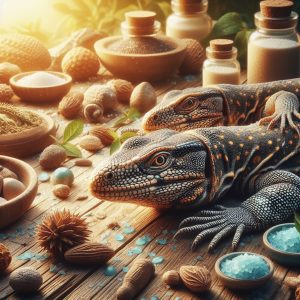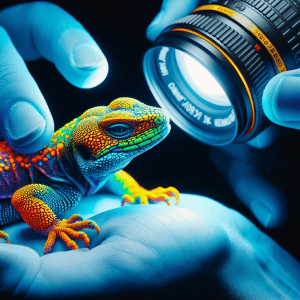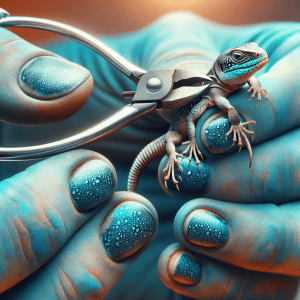Introduction: Understanding the Importance of Hygiene for Lizards
Have you ever wondered why some lizards thrive while others struggle with poor hygiene? Let’s dive into the fascinating world of lizard hygiene. As a seasoned reptile enthusiast, I’ve seen firsthand how crucial cleanliness is for our scaly friends.
Maintaining proper hygiene isn’t just about keeping your lizard’s enclosure clean—it’s about safeguarding their health and well-being. Neglecting hygiene can lead to a host of issues, from skin infections to respiratory problems.
One interesting fact about lizard hygiene is that different species have unique cleanliness requirements. For example, arboreal lizards may need more frequent misting to maintain optimal humidity levels.
Ensuring your lizard’s hygiene is top-notch doesn’t have to be complicated. By implementing a regular cleaning routine and providing a balanced diet, you can help your pet lizard thrive.
So, the next time you see your lizard basking under their heat lamp, take a moment to appreciate the importance of good hygiene in their world. After all, a clean lizard is a happy lizard!
Signs of Poor Hygiene in Pet Lizards
Signs of poor hygiene in lizards are essential to recognize for any responsible lizard owner. Neglecting hygiene can lead to serious health issues for your scaly friend. One common sign of poor hygiene is a dirty, unkempt enclosure. If you notice a buildup of waste or mold, it’s time for a deep clean. Lizards are known for their pristine skin, so any signs of skin infections or irritations could indicate hygiene problems. Another indicator is a foul odor emanating from your lizard’s habitat. It could be a sign of bacterial growth due to poor hygiene practices. Keep an eye out for any abnormal behaviors in your lizard, such as decreased appetite or lethargy, as these could be linked to hygiene-related health issues. Remember, prevention is key when it comes to maintaining proper hygiene for your lizard. Regularly clean and disinfect their habitat, provide fresh water daily, and monitor their overall health closely. By staying proactive and attentive to your lizard’s hygiene needs, you can ensure a happy, healthy companion for years to come.
Common Causes of Hygiene Issues in Lizards
You know when you walk into a room and immediately get hit with a funky smell? It’s not pleasant, right? Well, imagine living in that stench 24/7. That’s what poor hygiene can do to your pet lizard. Trust me, it’s not a pretty sight.
Imagine this: you come home after a long day, excited to see your scaly friend, only to notice something off about them. Maybe they’re looking a bit dull, or their skin seems rougher than usual. These subtle signs could be red flags for poor hygiene in your lizard.
Neglecting your lizard’s hygiene can lead to a whole bunch of health issues. From skin infections to respiratory problems, the consequences can be serious. It’s like skipping showers for weeks – eventually, things start to go downhill fast.
But fret not! There’s light at the end of the tunnel. By implementing simple hygiene practices, like regular cage cleaning and monitoring their diet, you can keep your lizard happy and healthy. It’s all about creating a clean and comfortable environment for your scaly buddy to thrive in.
So, next time you’re giving your lizard some love, remember that good hygiene is key to their well-being. After all, a clean lizard is a happy lizard!
Health Consequences of Neglecting Lizard Hygiene
When it comes to maintaining proper hygiene for your pet lizard, there are a few key factors to consider. Neglecting hygiene can lead to serious health issues for your scaly friend, so it’s essential to stay on top of things. Let’s delve into some practical tips for ensuring your lizard’s hygiene is in top shape.
First and foremost, regular cleaning of your lizard’s enclosure is crucial. Not only does this help prevent the buildup of bacteria and mold, but it also provides a clean and comfortable environment for your pet. Remember, a clean habitat equals a happy lizard!
Incorporating proper diet and hydration is another essential aspect of lizard hygiene. Did you know that dehydration can lead to skin shedding issues in lizards? Ensure your pet always has access to fresh water and a balanced diet to promote overall health and hygiene.
Additionally, regular health check-ups with a reptile veterinarian are vital for monitoring your lizard’s well-being. These check-ups can help detect any hygiene-related issues early on, allowing for prompt treatment and prevention of more serious complications.
By taking these proactive steps to maintain your lizard’s hygiene, you are not only ensuring their health and happiness but also strengthening your bond with your scaly companion. Remember, a clean lizard is a healthy lizard!
Tips for Maintaining Proper Hygiene Practices for Your Lizard
Alright, let’s dive into the nitty-gritty of maintaining proper hygiene practices for your beloved pet lizard. Picture this: you walk into your lizard’s enclosure and notice a musty odor lingering in the air. You start to wonder if you’ve missed something in your cleaning routine. Sound familiar? Poor hygiene in lizards can lead to a host of health issues, from skin infections to respiratory problems. But fear not, for there are simple steps you can take to ensure your scaly friend stays happy and healthy. Did you know that one of the most common causes of poor hygiene in lizards is inadequate enclosure cleaning? Lizard enclosures need regular cleaning to remove waste, uneaten food, and bacteria buildup. It’s like giving your lizard a sparkling clean home to thrive in! To maintain optimal hygiene, consider using reptile-safe cleaning products and disinfectants. These products can help you combat harmful bacteria and keep your lizard’s living space squeaky clean. So, the next time you’re scrubbing away in your lizard’s habitat, remember that you’re not just cleaning – you’re safeguarding your pet’s well-being. A little extra effort in hygiene today can go a long way in ensuring a healthy and happy tomorrow for your scaly companion.
Recommended Cleaning Products for Lizard Enclosures
Have you ever wondered about the best cleaning products for your lizard’s enclosure? Let’s dive in. Keeping your lizard’s habitat clean is crucial for their health and well-being. It’s like giving them a five-star hotel experience! The type of cleaning products you use can make a big difference in maintaining proper hygiene for your scaly friend.
When choosing cleaning products for your lizard’s enclosure, opt for those specifically designed for reptiles. Avoid harsh chemicals that could harm your pet. Imagine using a soap that smells like fresh oranges – your lizard might enjoy that!
One important tip is to use a reptile-safe disinfectant to clean the enclosure regularly. This helps prevent the growth of harmful bacteria and keeps your lizard healthy. Remember, cleanliness is next to lizardliness!
Did you know that some cleaning products can be harmful to certain lizard species? Be sure to research which products are safe for your specific type of lizard. It’s like finding the perfect skincare routine for your pet!
By using the right cleaning products and maintaining a regular cleaning schedule, you can create a safe and comfortable environment for your lizard. So, next time you clean your lizard’s home, think about the products you’re using and how they can contribute to your pet’s well-being.
Understanding the Role of Diet in Lizard Hygiene
When it comes to the role of diet in lizard hygiene, it’s absolutely crucial to get it right. Think of it like this: you are what you eat, right? Well, the same goes for your scaly friend! Imagine dining on junk food every day – how would that make you feel? Lethargic, sluggish, and just not your best self. That’s exactly what can happen to your lizard if their diet is lacking. Now, here’s where things get interesting: did you know that some lizards are strictly herbivores while others are carnivores? It’s like having a vegetarian roommate while you’re a meat lover – different strokes for different folks! So, when planning your lizard’s meals, consider their species-specific dietary needs. You wouldn’t serve a salad to a steak enthusiast, right? Likewise, you shouldn’t serve insects to a herbivorous lizard. It’s all about catering to their unique tastes and nutritional requirements. By ensuring your lizard’s diet aligns with their natural preferences, you’ll not only keep them healthy but also happy. After all, a well-fed lizard is a content lizard, ready to bask in the sun and show off their vibrant scales. So, remember, when it comes to feeding your scaly companion, it’s all about serving up a balanced diet that suits their individual palate.
Preventing Parasitic Infections through Hygiene Practices
Parasitic infections are a real threat to your scaly friend, and prevention is key. Did you know that certain parasites can wreak havoc on your lizard’s health without proper hygiene? It’s like a tiny invasion happening right in your pet’s habitat! But fear not, with a few simple steps, you can keep these pesky parasites at bay. One practical tip is to regularly clean and disinfect your lizard’s enclosure. By maintaining a clean environment, you can significantly reduce the risk of parasitic infections. Additionally, consider adding natural elements like certain plants or substrates that can help deter parasites while enhancing your lizard’s habitat. It’s like creating a fortress of cleanliness for your little buddy! Remember, a proactive approach to hygiene can go a long way in ensuring your lizard stays healthy and happy. So, don’t let those sneaky parasites ruin the party – take charge of your lizard’s hygiene today!
Importance of Regular Vet Check-ups for Lizard Health
When it comes to ensuring the health and well-being of your pet lizard, regular vet check-ups are crucial. These check-ups not only provide a professional assessment of your lizard’s overall health but also help in early detection of any potential issues that may arise.
Imagine this: You take your lizard to the vet for a routine check-up, expecting everything to be fine. However, during the examination, the vet notices subtle signs of a developing health problem that you wouldn’t have noticed on your own. Thanks to the vet’s expertise, early intervention can prevent a minor issue from escalating into a major health concern for your beloved reptile.
Regular vet check-ups for lizards serve as a preventive measure, much like how humans visit the doctor for annual check-ups. These visits help ensure that your lizard is in optimal health and can address any underlying health issues before they become serious. Additionally, your vet can provide valuable advice on proper care and hygiene practices tailored to your lizard’s specific needs.
So, the next time you schedule a vet appointment for your lizard, remember that it’s more than just a routine visit—it’s a proactive step towards maintaining your pet’s health and happiness. By prioritizing regular vet check-ups, you are taking a significant stride in being a responsible and caring lizard owner.
Conclusion: Ensuring Optimal Hygiene for a Happy and Healthy Lizard
Ever wondered why poor hygiene in lizards can lead to serious health issues? Let’s dive in!
Maintaining cleanliness for your scaly friend isn’t just about aesthetics—it’s crucial for their well-being.
Imagine this: a lizard basking under a heat lamp, unaware of the lurking dangers of unclean conditions.
Did you know that poor hygiene can make lizards more susceptible to infections and illnesses?
Ensuring a clean habitat and proper grooming habits can significantly boost your lizard’s vitality.
Consider this practical tip: regularly clean your lizard’s enclosure and provide fresh water daily.
Remember, a healthy lizard is a happy lizard! It’s all about creating a safe and hygienic environment.
Now, think about this: what steps can you take today to improve your lizard’s hygiene?
By prioritizing cleanliness, you’re not just caring for your pet—you’re promoting a vibrant lizard lifestyle.
So, are you ready to embark on a journey towards optimal hygiene for your scaly companion?
Let’s make sure your lizard stays in top shape by embracing the power of hygiene!




